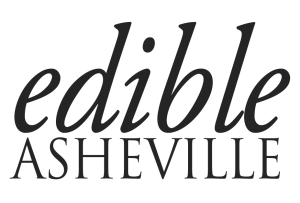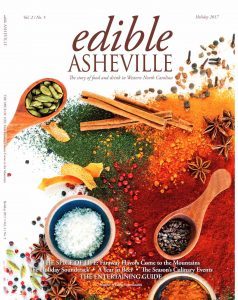A SOUTHERN TRINITY
A Q&A with Rising Appalachia
PHOTOS BY RENÈ TREECE
***
The popular folk duo Rising Appalachia, composed of sisters Leah Song and Chloe Smith, grows deeper roots in the Asheville area, embracing local food to nourish the body and soul.
EDIBLE ASHEVILLE: Rising Appalachia has been coming to Asheville to perform for several years, but you now call the Asheville area home—or at least a part-time home. Can you tell us more about your connection to the Asheville area?
RISING APPALACHIA: We have always held what we call a Southern trinity. We were born and raised in Atlanta, in a very potent urban neighborhood that our family still resides in. We spent many early years living and learning in the city of New Orleans, but we started coming up to Asheville and the surrounding areas with our family as little girls.
Our mother was an avid student of Appalachian fiddle traditions and came up to the area for several contra dance and old-time music gatherings. So we also grew up contra dancing at the Old Farmers Ball and the early Black Mountain Music Festival, and we volunteered at the Swannanoa Gathering as students of old-time and Celtic ballad traditions.
The rich traditions of the Southern Appalachians have been very impactful to our sense of home and our sense of belonging. In addition to all that, the local earthskills gathering FireFly and the work of Wild Abundance have both been tremendously influential to our knowledge of wildcrafting and Appalachian herbal lore. We met our drummer Biko Casini in Asheville when we were all gallivanting in early 2000. Our guitarist David Brown and our fiddle player Duncan Wickel are both Asheville natives, and now one of our favorite recording studios Echo Mountain has become a bedrock in our recording world.
All in all, the Southern Appalachian mountains and the artful world of Asheville have been a big part of our long, woven story.
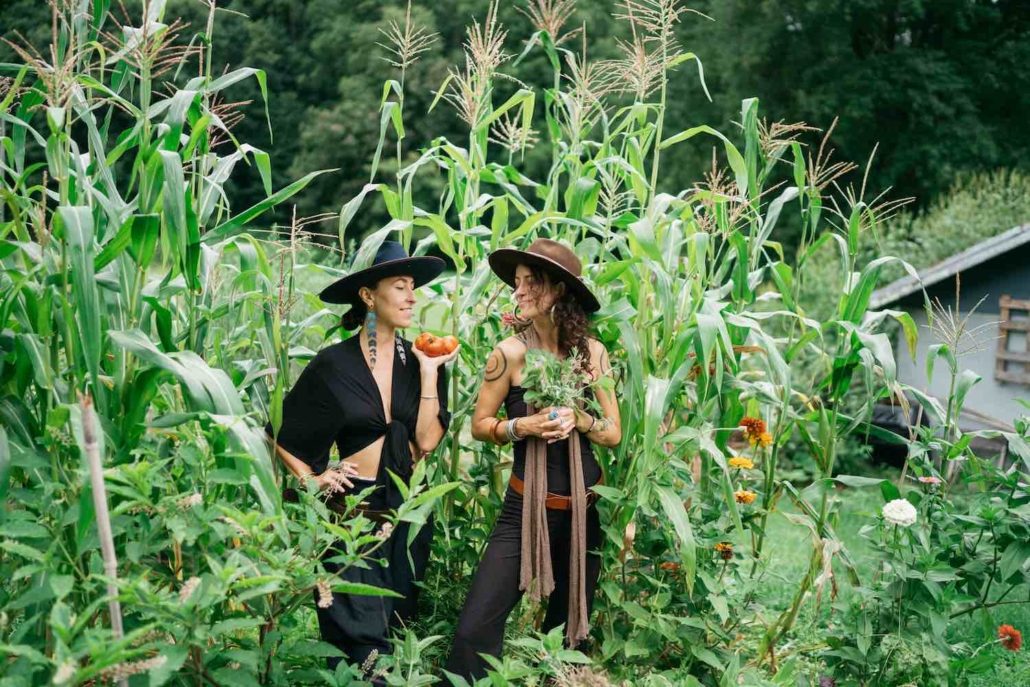
You’ve traveled to many parts of the world while on tour. Are there any types of cuisine that you’re especially fond of?
(Chloe) I could live and die eating Thai food all day, everyday, and never think about anything else.
A lot of your music pays homage to a sort of ancient wisdom. When it comes to food, we’ve gained some conveniences and affordability in the 21st century by mass-producing our food, but do you think we’ve lost something in the process of doing that?
We started a notion called the Slow Music Movement that was inspired by the Slow Food Movement. It’s all about re-envisioning why and how the music industry got so fast-paced and where we can step in and make change. A lot of that is for our own sanity on the road—making sure we don’t tour so much that we get burnt out by the very art we are delivering. We work hard on staying longer in towns so we can get to know what’s going on, working with nonprofits, eating locally, and taking slow transit when possible.
What we lose in a fast-paced world is context— of how long things take to be done well, of how many resources go into moving people or food or ideas around the planet. It’s not that nothing good happens fast; it’s that somehow society has lost track of the juiciness of slow. We believe that is slowly changing, and people are realizing the benefit of waiting for good quality to come their way.
We’ve heard about your work with the Permaculture Action Network and then, here on a local level, with the Soul & Soil Project. Can you tell us more about those projects?
Yes, it has been an immense part of our work to make place-based impact through our music. Sometimes performance, music and touring itself can feel so ethereal and intangible. We have always wanted to find ways to literally keep our hands in the earth and use the momentum of a concert to directly impact land rights, food justice, and local impact-based projects.
The Permaculture Action Network is an incredible organization that we have partnered with for many many years that essentially does just that by working with regional farms and urban gardens to create a full day of volunteering that follows a concert the night before. So essentially, concert goers can “continue the party” at an all-day action day inclusive of live music, local talks, and functional farm support. Barns are erected, neighborhood parking lots are turned into community gardens, lots are transformed, dance parties spring to life, and the labor needed to weed back a garden bed happens in no time. The momentum of a concert is literally put directly into creating more food sovereignty, more connection, and more gardens in the places that we play. It is truly a magnificent way to see our music alive.
Learn more at permacultureaction.org
Do you garden or farm yourselves? How about cooking or preparing meals? Do you consider yourselves good cooks?
Yes, when we are not song crafting, you can often find either of us wild foraging food or growing produce in our gardens. It’s not an easy balance to strike when spending so much time on the road, but there are few things more pleasing than eating food you started from seed. It’s a glorious grounding from tour life!
We both love to cook and nourish ourselves with home-cooked food, especially simple fare cooked on the fire. We’ve had the opportunity to eat and learn from some of the best chefs in the world while on tour, particularly when we did a tour in Canada called Sea to Seed where we had farm-to-table dinners each night and toured by sailboat.
Some of our favorite food to cook is stuff pulled right from the garden and cooked lightly with just a little salt and olive oil, thereby letting the true flavor of the veggie really stand out on its own. In future years, we certainly hope to learn more about canning and fermenting, wild mushroom identification and herbal lore.
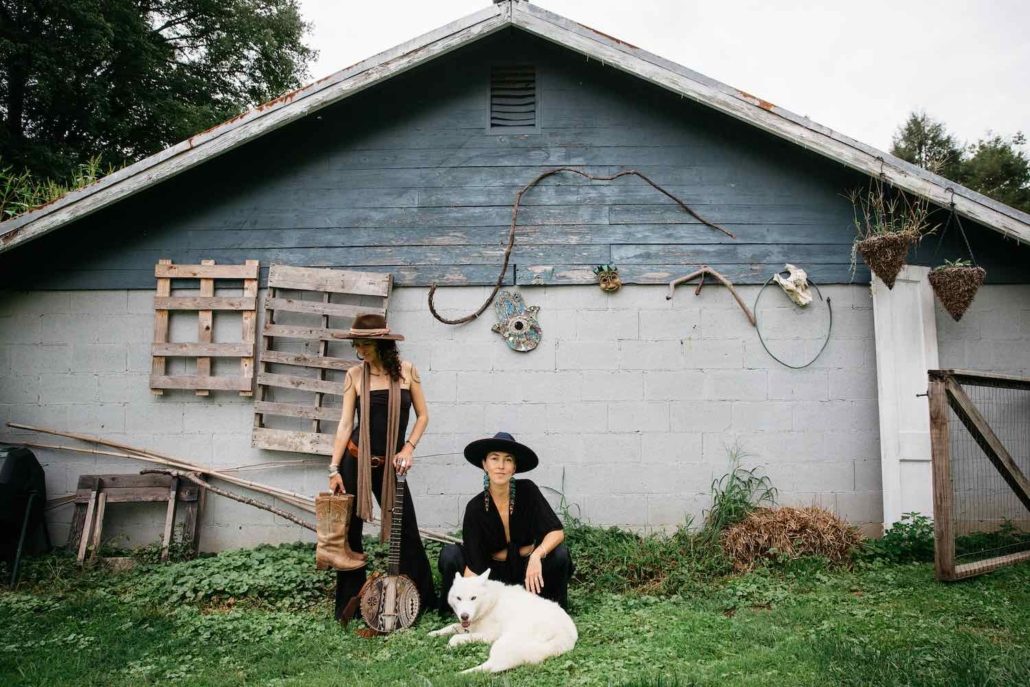
If you go to local farmers markets, or subscribe to CSAs, can you tell us about those?
There are some amazing farmers markets in Atlanta that we frequent when home; our favorite being the Freedom Farmers Market at Carter Center. In Asheville, we have visited all the various markets around town and relish getting fresh produce from local farmers when we are here. Chloe is an avid gardener now, so she often is just pulling veggies straight from the little piece of earth she calls home.
How about our local restaurants? Do you have any favorites?
Hard to keep track of all the amazing restaurants in this little town. But in the past, we have loved Bull and Beggar, Smoky Park Supper Club, Mela, Chestnut, Owl Bakery, Forestry Camp, and, of course, all the food trucks scattered about town.
Honestly, because we tour so much, we often are so happy to get back home and cook our own food with garden goods or wild edibles we have foraged.
What would be a perfect meal for you?
Natural, freshly pulled farm food from the garden, cooked on an overpit fire by someone who knows perfectly how to season without overdoing it. Grilled radishes in olive oil; oysters fresh from the water; pears in honey; bone marrow and rosemary sourdough; pickled okra and goat cheese. Nothing fancy; just simple, fresh fare.
We’re big fans of listening to music while we cook. Any albums you can recommend for us as the cooler weather lets us have more time in the kitchen?
Nameless by Dominique Fils-Aimé; Bamanaya Sira by Biko and Arouna; and Dogs in the Daylight by Jeffery Martin
Save
Save
Save
Save
Save
Save
Save
Save
Save
Save
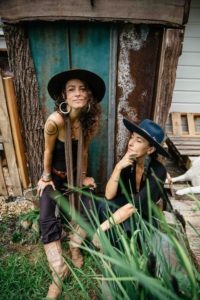
Rising Appalachia, composed of sisters Leah Song (left) and Chloe Smith
THE WEEKLY REVEL
Sign up for your free handpicked guide to enjoying life around Asheville.
Available weekly from May to October.

